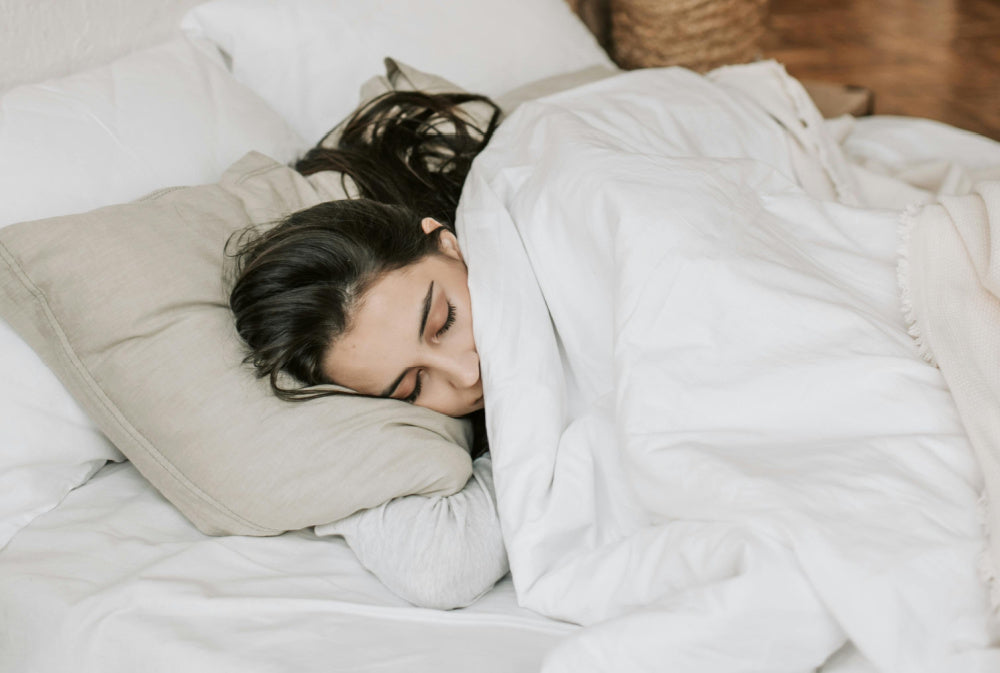Sleep often feels like a distant memory once you’ve woken up. Sometimes the ups and downs of life keep you awake at night; or perhaps the clock changes and the transition from one season to another plays havoc with your sleep routine and causes you to feel more anxious and irritable?
You’re not alone. According to a recent 2021 study, ‘nearly one-third of the general population experience symptoms of insomnia’, and between 4% and 26% face the opposite problem of excessive sleepiness.
But, tiredness is only one effect of a lack of good sleep. Poor sleep also affects our mental health, and can cause you to feel down, stressed, or even grumpier than usual.
Why Is Sleep So Important For Mental Health?
Professor Colin Espie, Professor of Sleep Medicine at the University of Oxford says, “sleep is a ‘need to have’, just like oxygen, water and food. We need to value and prioritise the benefits of sleep because good sleep has a very significant positive impact on our mental health.”
But why? Why is it so important, and how does a lack of sleep affect mental health?
While we don’t know exactly why we need to sleep, there’s no denying you feel better after a night spent safe in dreamland. One reason why this may be is that when you sleep, your brain has a chance to process the things you’ve experienced during the day. This helps you make, and remember, memories.
Another reason why sleep is important is that it gives your brain the time to flush any ‘waste’ that has built up during the day, meaning you can wake up feeling refreshed and ready each morning.
Of course, both of these can help your mental health. Giving your brain time to process the day, and clear out unneeded information, reduces the chances of ‘brain fog’ which stops you from being able to focus. It also gives you a fresh start each day, which can help you feel more positive.
From an emotional point of view, sleeping helps us to handle our emotions in a more healthy and stable way.
When you sleep, activity in the brain is directed to your emotional centres, which helps them to prepare for unexpected situations. For example, a part of the brain called the amygdala is mostly responsible for our fear response. With a proper night’s sleep, the amygdala is more prepared to handle stressful situations, rather than overreact and cause you to feel stressed or moody.
What Can Cause Problems With Your Sleep?
We’ve all had to deal with stress or worry in some way, and these can easily affect how we sleep. There are a lot of reasons you might be asking ‘why can’t I sleep?’, including:
- Having a busy work life, or working a shift pattern.
- Looking after young children or relatives.
- Scrolling on your phone.
- Feelings of anxiety.
- Noisy neighbourhoods.
What you need to know is that the relationship between sleep and mental health is circular. When you feel rested, it’s easier to focus and think positively about situations in your daily life. However, if you’ve had a broken or poor night’s sleep, studies suggest you’re more likely to deal with low moods and poor emotional control.
Mental health struggles can lead to more disrupted sleep, and then the circle starts again – creating a type of sleep debt that builds up over time.
NEOM Top Tip: sometimes, there doesn’t feel like an immediate reason you can’t sleep, and that’s okay too. What is more important is finding new ways to help you sleep, and support your mental health.
Tips To Improve Your Sleep
As sleep and mental health feed into one another, by improving your sleep you may see some benefits in how you feel. To help you out, we’ve picked out some of our top tips to improve your sleep.
Create A Sleep Routine
Sticking to a routine is one of the best things you can do to improve your sleep. Going to bed at the same time every day tells your brain that it’s bedtime, and makes it easier for you to drift off comfortably.
Want to learn more? Check out our Tips For Improving Your Sleep Hygiene.
Use The Power Of Scent
Our sense of smell is a totally underrated sense, but it’s actually very powerful. So, make sure you're putting your best foot forward by exploring how different scents can help to improve your sleep (and mental health).
NEOM Top Tip: essential oils have been proven to be particularly useful when it comes to boosting your mood.
Studies have shown that floral scents can actually boost your mood by reducing feelings of anxiety and sadness – so why not check out the zingy, mood-boosting Orange Blossom and Neroli Essential Oil blend?
Soothing and earthy scents, like lavender, have consistently shown to have a positive impact on sleep. Discover our Scent to Sleep range, including the Perfect Night’s Sleep blend of lavender, chamomile and patchouli that’s tailor-made to soothe you to sleep.
And of course, make sure you have the right diffuser to spread these lush scents around your room by checking out our Wellbeing Pod Family…
Relax Before Bed
If you’re still struggling to snuggle up and drift off, perhaps it’s time to explore some new ways to relax before bed. Our favourites include:
NEOM Top Tip: looking for a good book to read before bed? How about The Four Ways to Wellbeing, written by our wonderful founder Nicola Elliott?
Better Sleep With NEOM Wellbeing
At NEOM, our Better Sleep range is fully stocked with an amazing selection of candles, pillow mists, essential oils and more – all designed to help you relax in the evening and slip into a peaceful sleep.
Want more sleep tips and tricks? Check out… Sleep Is The Unsung Hero Of Mental Health | These Are The UK’s Most Googled Questions On Sleep | How To Breathe For Better Sleep



